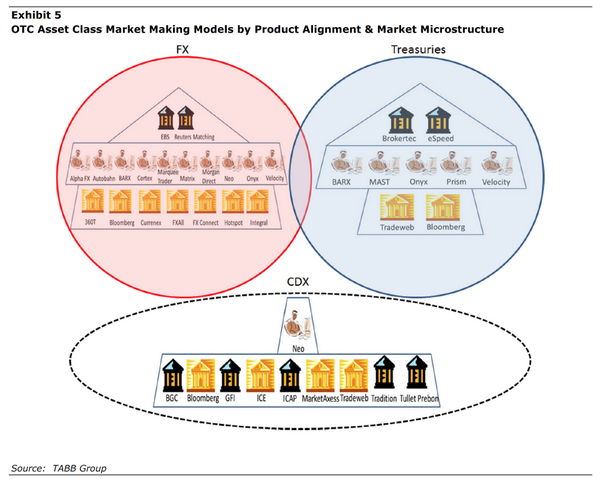New TABB Group Research Says Maker
Post on: 16 Март, 2015 No Comment

New TABB Group Research Says Maker/Taker, Other Pricing Distortions Not Necessarily Bad for Equities Market
Projects Eliminating Rebates Would Reduce Number of Exchanges from 11 to 7, Cutting Off-Exchange Trading, Seen as Being Possible Detriment
In new research announced today, TABB Group says that the equity market is not distortion-free, that rebates and maker/taker pricing are not necessarily detrimental for the equities market. However, as Larry Tabb, TABB’s founder, CEO and a market structure expert who wrote “Rebates and Markets Distortions: The Cost of Liquidity? ” sees it, eliminating rebates runs the risk of reducing the current number of exchanges from 11 to 7. This would cut off-exchange trading and as Tabb says, that would not necessarily be good for the market.
The new report covers incentives and their impact; why pricing structures matter; lower cost vs. best execution; exchange fees; tiered pricing; dark pools and market impact; eliminating maker/taker; and winners and losers.
Exchange rebates are currently in the news and although discussing rebates and maker/taking pricing might be interesting, Tabb warns that it misses the broader picture of pricing distortions, or non-transparent payment mechanisms, that create artificial ripples in the price-discovery process. These mechanisms attract flow to venues where it may not necessarily belong and may not have the best execution history.
While rebate pricing schemes are the most controversial at the moment, there are other distortive practices, including exchange pricing tiers; the development of internalization and ATS platforms; payment for order flow (PFOF) relationships where wholesalers buy order flow from retail brokers; and soft-dollar relationships where commission dollars are used to pay for brokerage services, typically including trading tools, research and corporate access. “Each of these mechanisms leverages discrete payment channels to influence the routing of order flow,” he explains.
Clearly understanding all of the various perverse incentives and value propositions is difficult and harvesting / leveraging them can be incredibly complex and expensive. But, says Tabb, because issues are complex and expensive doesn’t mean they need to be banned or artificially “simplified” by regulators. “What would simplification look like? If we banned maker / taker, would we also need to ban exchange pricing tiers, payment for order flow, and soft dollars as well? And even if we did ban these practices would they make the market fairer, less volatile, less electronic, less risky, or just simpler?”
According to Tabb. incentive programs, while complex, benefit many. The question is should simplifying complexity for complexity’s sake be the regulators’ goal, especially since most of this complexity is abstracted away by fast computers, smart order routers and high speed networking? “While we are a proponent of simplicity, our target shouldn’t be simplicity alone. It should be a market that enables efficient, effective and trustworthy re-allocation of capital in a measurable way. Our goal should be not just be fairness, but an easy way to measure, understand and quantify execution quality and any tradeoffs. If the tradeoffs do not benefit you, your firm and your clients, then change should just be a click away.”

About TABB Group
Based in New York and London, TABB Group is the research and consulting firm focused exclusively on capital markets, based on the interview-based, “first-person knowledge” research methodology developed by Larry Tabb.
martinrabkinink
Martin Rabkin, 914-420-5739














